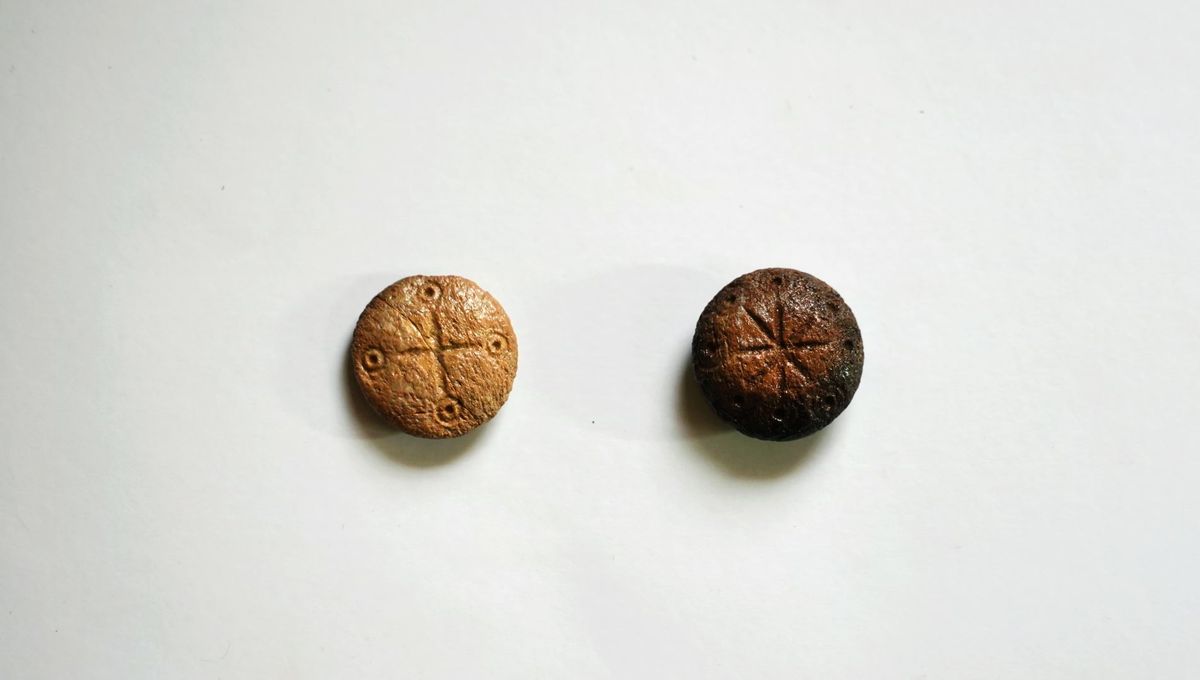
One thousand six hundred years ago, in a city named after the famous emperor Hadrian, bored Roman soldiers spent their free time shuffling counters around a game board in an attempt to hone their strategic thinking skills – or maybe just to have fun. Announcing the discovery of two of these ancient tokens, archaeologists say that the games played by these legionaries were probably pretty similar to those that many of us still enjoy today.
ADVERTISEMENT GO AD FREE
Describing the two disk-shaped bone counters in a statement, excavation leader Dr Ersin Çelikbaş explained that one of the pieces features a “four-armed symbol” while the other is adorned with an eight-armed sign. “There are punctuation marks made with the engraving technique at the ends of these arms. These are actually symbols that help the player determine the strategy of those… game pieces,” he said.
The ancient artifacts were found at the archaeological site of Hadrianopolis in Türkiye, named in honor of Hadrian and the success he had in enhancing the power of the Roman Empire in the Middle East during the second century CE. Among the many impressive structures unearthed in the city is a military fortress, indicating that the Roman army had a significant presence in the city during the famous ruler’s heyday.
“These small findings show us that this military presence maintained its existence in Hadrianopolis for many years,” explained Çelikbaş. Dated to the fifth century CE, the game pieces “indicate that this unit maintained its existence for approximately 200 or 300 years,” he said.
This assertion is backed up by the fact that the counters appear to have been used for “games based on military strategy,” suggesting that “the people who play[ed] them [were] most likely from a military background,” added Çelikbaş.
More specifically, he said the pieces were probably used to play a game called “Ludus Latrunculi”, in which players attempted to surround and capture their opponent’s pieces, or “Doudecim Scripta”, which resembles backgammon.
ADVERTISEMENT GO AD FREE
Board games like these are known to have been popular throughout the ancient world, with Roman soldiers having spent much of their downtime enjoying the precursors to some of today’s most widespread games. For instance, there’s evidence that soldiers stationed in Judaea played a game called Alquerque – which later evolved into checkers – while another ancient pastime known as 58 Holes bears a strong resemblance to chutes and ladders.
“Similarities and connections can be established between these games and today,” said Çelikbaş. “Checkers played today – this is also a strategy game… [Battleships] is also a strategy game. When we look at digital games, it is possible to say that today’s minesweeper is again a military strategy game.”
“Although their names have changed from ancient times to today, we can say that all of these games are actually based on military strategy,” he said.
Source Link: Military Strategy Game Pieces Used By Roman Soldiers Discovered In Türkiye